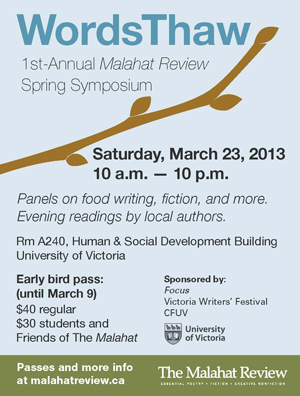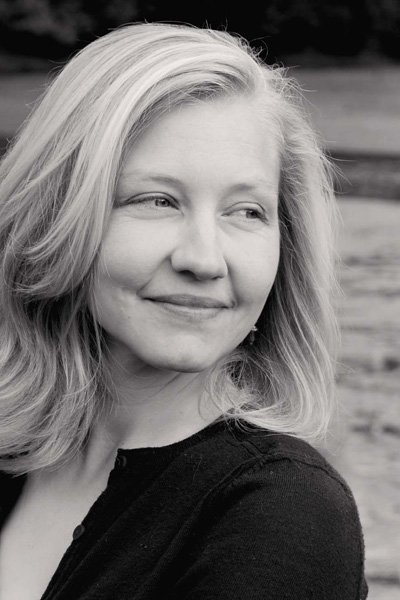Our 1st-annual spring symposium:
WordsThaw 2013!

Saturday, March 23, 2013
10:00 a.m. - 10:00 p.m.
UVic, Human and Social Development Bldg.
Room A240
Join us for an intellectual icebreaker at the cusp of spring! Three daytime panels and a literary reading in the evening.
Panels:
"Zoom In, Zoom Out: Focus on Fiction" moderated by Amy Reiswig with John Gould, Yasuko Thanh, and Daniel Griffin. (Sponsored by Focus magazine).
"A Sustainable Feast: The New Food Writing" moderated by Don Genova, with Rhona McAdam and Kimberley Veness.
"In our Names: Writers on Poverty," with panelists Patrick Lane, Madeline Sonik, and Sylvia Olsen. (Organized by the Victoria Writers' Festival).
"Words on Ice," a reading with our UVic 50th Anniversary Prize winners Pamela Porter, Laura Kraemer, and Katherin Edwards as well as local writers Bill Gaston, Marilyn Bowering, Lorna Crozier, Lee Henderson, and C. P. Boyko.
Tickets can be purchased from our website:
Earlybird rates (until March 13th) for full pass (includes all panels and literary reading):
Regular: $40
Students/Friends of The Malahat: $30
**All full passes include a one-year subscription to The Malahat Review or an extension of your current subscription.
More information about WordsThaw 2013 on our website.
A look inside issue 181, Winter 2012

"Returning"
Creative Nonfiction
by Carla Funk
Over the white earth at the verge of thaw, over the stands of lodgepole and jack pines rusted with bug wood, over the bush camps smoking with machinery and crews, over the potato flats and leafless poplar scrub, nameless lakes and Blackwater
gold, over the cargo train curving west on the rails, over the highway
of lost girls that cuts to the valley, over the half-mile grid of roads that
make the town, and down, over the river unlocking its ice, down to the
early spring field in a hub of clamour and ruckus, the snow geese come.
Read "Returning" in full on our website.
Writing with Funk: John Threlfall in Conversation with Carla Funk
JT: You're primarily known as a poet, yet you just won a creative nonfiction prize. How often do you write nonfiction?
CF: Over the past two years, I've been plunking away at nonfiction, rekindling my early urges for the genre. As a teenager, I had an after-school job as a typist for the community newspaper; eventually, they had me covering local stories, which somehow turned into me writing a weekly humour column called "Carla's Corner" (cringe). But I've always loved writing from life. Whenever poetry is on the backburner, nonfiction is what's cooking now.
Read this interview on our website.
Interviews with the winners of our 2013 Open Season Awards

Engines of Salvation: Linda Rogers in Conversation with 2013 Open Season Award for Poetry winner, Lisa Martin-DeMoor
LR: Congratulations on winning the 2013 Open Season Award for poetry. How are you affected by prizes? Do they give you the affirmation you need to go forward or is writing your naughty pleasure, something that needs no encouragement beyond the joy of itself? I ask you this contemplating a number of possible answers because community acceptance, while a universal need, is also a complication.
LMD: Yes, I am affected by prizes, and they do provide an affirmation to go forward. "Believing is not the same as Being Saved" is a new kind of poem for me, more narratively driven. The draft had been kicking around for a long time, not working. When I finished it in the fall, I felt pleased with it. I felt that the poem was doing real work. So this is a corroboration. But, yes, community acceptance (and its apparent lack) is a "complication," as you say.
Read the rest of this interview on our website.

The Truth of Human Experience: Alexandra Handley in Conversation with 2013 Open Season Award for short fiction winner Carmelinda Scian
AH: Was "The Butterfly First" a piece written for the Open Season Awards, or did it come about before the contest?
CS: “The Butterfly First” began as a longer piece written for a Masters course workshop at the School of Continuing Studies at the University of Toronto. In the longer version, Milita has a younger brother and her grandfather plays a more prominent role. I decided to leave the two characters out in the shorter version so as not to crowd the story, which is really about Milita and her early awareness of the world around her.
Read the rest of this interview on our website.

The Sensual Complexity of Being: Benjamin Willems in Conversation with 2013 Open Season Award for creative nonfiction winner Susan Buis
BW: First off, congratulations on winning the 2013 Open Season Award for creative nonfiction. Susan Olding nailed it down in her comments about "The Falling House": it's all about the way things are painted, the layers of the paint. The story's most crucial element is its paintedness, after all, the looseness of everything detailed. Each fine point is essential, though there are many fine points. As important as this is in writing, it's maybe a more obvious focus in the visual arts. But you hadn't at this point painted in twenty years, and this is surely a piece of writing. Is the dense, panoramic language in here just what comes out of you automatically—at least as far as writing goes?
SB: The density of my writing comes from my training as a poet, and my intention to reproduce, maybe just of an instant, the sensual complexity of being. In visual art, this can be accomplished through techniques such as overlay, multi-disciplinarity, and intertextuality. Ten years ago, I had to choose between accepting a graduate position in Visual Arts or in Creative Writing, and opted for writing. I find it so economical of means; I need only pencil, paper, edge of a table, and a period of silence. I approach my prose texts as if writing poetry, prioritizing metaphor and image over narrative. I have no gift for plot.
Read the rest of this interview on our website.
|